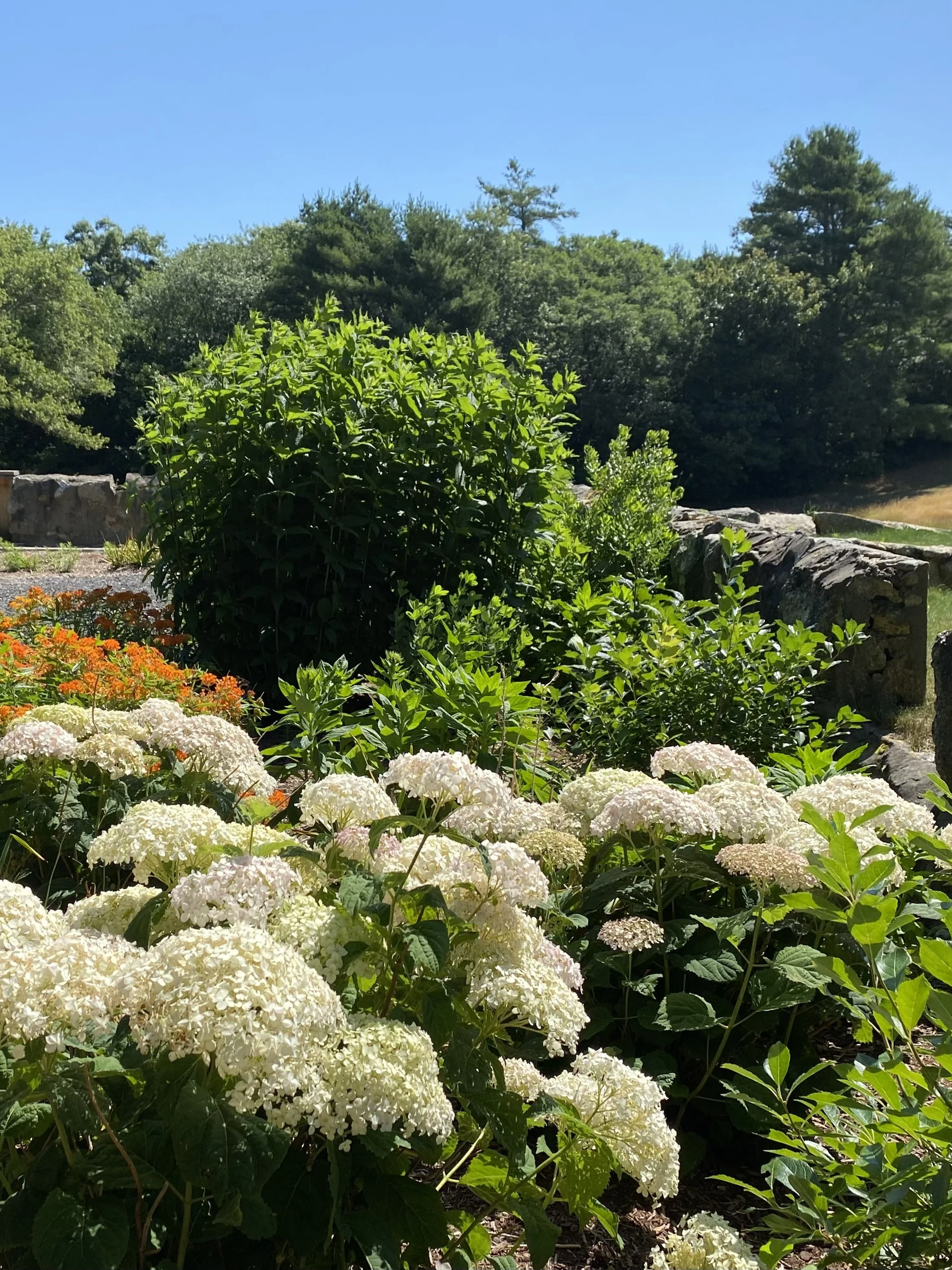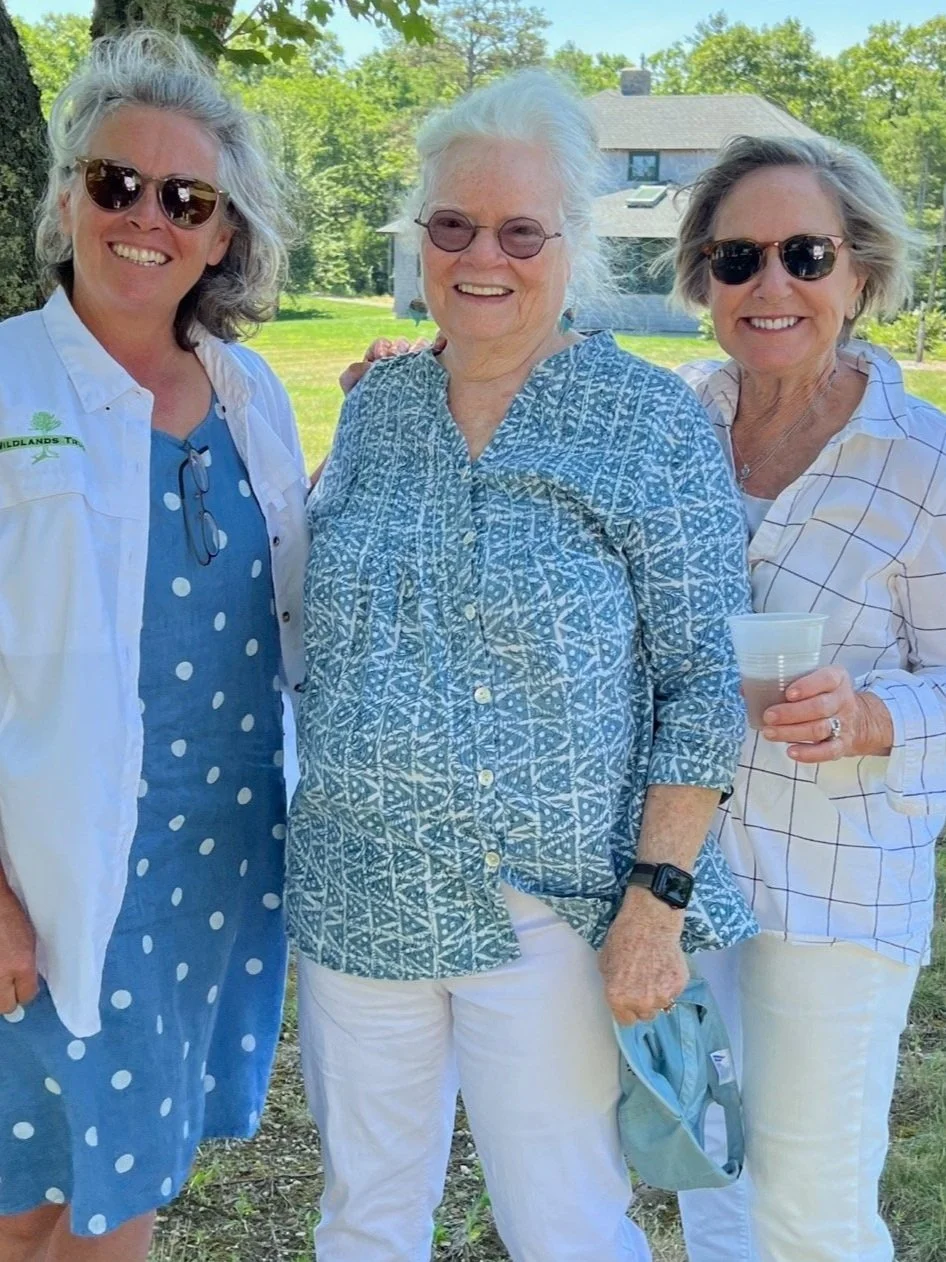What’s New at Wildlands
Native Plant Garden in Plymouth Dedicated to Deborah Wood Davis
Read Time: 3 min
By Amy Markarian, Senior Copywriter
On Saturday, July 9, at 10:30am, before the morning sun invited summer’s characteristic heat and humidity, approximately 70 community members gathered at Wildlands Trust’s headquarters on Long Pond Road to dedicate the property’s native plant garden to a longtime supporter of the Trust’s mission, Deborah Wood Davis.
Deborah Wood Davis married into the family of Howland Davis, the previous owner of the land that is now Wildlands’ Davis-Douglas Conservation Area. Her family recalls Deborah’s great affection for the area and, according to her daughter Caroline Chapin, she was excited by Wildlands’ mission and the way it drew the community together. So, when Deborah’s five daughters were looking for a way to honor their mother and the strong roots and connections she had established here, they came to Wildlands Trust.
Sarah Geer, one of those daughters, approached Wildlands’ President and Executive Director Karen Grey to discuss the idea at just the right time. Wildlands had been struggling with the desire to maintain some component of the property’s historic barn, but its crumbling foundation walls and the steep drop from ground level to its interior depth posed hazards that had to be addressed. Simultaneously, local landscape architect Love Howard had also reached out to Karen with the idea of designing a pollinator-friendly garden using native plant species that would support the local ecosystem, and she was looking for a location where she could bring the idea to life. The Davis family’s gift to honor their mother provided the needed support to begin the process of converting the unsafe barn foundation into a showcase garden and educational tool at Wildlands’ headquarters.
The project, according to Karen, “brought together need with opportunity and allowed us to make meaningful connections for people, which are always the best type of projects.” In the fall of 2020, after structural work was completed, the first plants were added by a group of volunteers—including some of Deborah’s daughters, Wildlands volunteer and Board Member Marilynn Atterbury, and others—under Love’s guidance. Today, Marilynn continues the work, along with Wildlands’ gardener Kim Goggin, carefully maintaining and enhancing what is often called “the foundation garden.”
On the morning of the dedication ceremony, the gardening team’s hard work and meticulous care were on full display for the large crowd that had assembled for the occasion. In what would have been Deborah Davis’ 100th year, according to Caroline, the family organized a mini reunion around the dedication ceremony, bringing all five daughters, spouses, children, and almost all of the grandchildren and great-grandchildren together in Plymouth—a gathering of community that would likely have brought the family’s matriarch great pleasure. Also in attendance were several of Wildlands’ staff members, Board members, and supporters. Karen Grey addressed the group with gratitude for all who contributed to the project, Sarah Geer shared reflections of her mother, and Love Howard described her inspiration and plan for the garden’s creation. As the ceremony concluded, with a comfortable breeze under bright blue sky, the flitting of bees and butterflies entertained visitors as they reminisced and explored the newly dedicated Deborah Wood Davis Native Plant Garden.
Davis-Douglas Farm’s Demonstration Garden Is Abuzz With Activity!
By Amy Markarian, Senior Copywriter
In 2011, when Wildlands Trust set out to transform the Davis-Douglas Farm into the organization’s headquarters, there was a plan: break the project into several phases to ensure fundraising success. First was the site work, second was the old farmhouse restoration to serve as an office, and finally, phase 3 was the construction of the Community Conservation Barn for both events and the stewardship garage. But several years later, one visible piece was left unfinished.
In the middle of the field, at the top of the hill, lay the crumbling remains of what was once a working barn. Built in the 1890s, the old barn stood for nearly 100 years before it eventually just caved in. By the time Wildlands acquired the land, it was gone, and its beautiful, old foundation had the potential to become both a hazard and an eyesore. Knowing the value of preserving this historic artifact, Wildlands waited, and brainstormed, and waited some more. Then, in 2020 Karen Grey recruited local landscape designer Love Albrecht Howard to carry-out the new vision for the barn foundation.
The granite foundation walls would provide the perfect natural footprint for a pollinator-friendly, native perennial garden that could serve as a demonstration and teaching space for visitors to Davis-Douglas Farm. This was IT! The garden would beautify the office grounds, promote pollinator activity that is essential to maintaining native habitats, and it would be relevant to Wildlands’ mission and the needs of the community. The Davis-Douglas Farm transformation didn’t need just any structure to occupy this once-used space. It needed something with purpose and function, that would aid Wildlands in “providing the people of the region with the tools and support to build an enduring relationship with the land and water resources that are vital to our future,” as outlined in our strategic plan. What better way to fulfill this intention than by modeling and teaching others how they, too, can play an active role in the care and protection of the environment in their own living spaces?
With a plan in place, the work began in May 2020. To start, Wildlands enlisted the help of Jerry Richmond and his team, who were important partners throughout the renovation at our new headquarters. With Jerry’s help, the necessary structural changes were made: the foundation was filled; the upper entrance and garden path were developed for accessibility; a section of the wall was removed to make room for handicapped parking; and the removed pieces of granite were repurposed to create both a picturesque stairway entrance from the lower field and bench seating in the garden.
Then, in November 2020, Love Albrecht Howard led a group of volunteers in planting the first of the perennials that would bring this vision to life. A variety of flowering native plants were selected with the help of Morrison’s Garden Center to showcase blooms throughout the year. Pollinator-friendly practices were also utilized in the garden’s creation. Among these practices, Wildlands’ gardener Kim Goggin pointed out in a previous interview, are planting a variety of heights, colors and flower shapes to attract different birds and insects; keeping plants in groupings to allow pollinators to move easily from one flower to another; and refraining from raking leaves or removing stalks before the spring warm-up to provide a safe space for various insects to survive the winter months.**
Some of the many native plants on display in the demonstration garden this year are swamp milkweed, orange butterfly weed, aster, black-eyed Susan, yarrow, Coreopsis, winterberry, cranberry viburnum, and bee balm. The carefully selected flora are hosts and/or providers of nectar for a plethora of caterpillars, bees, flies, wasps, butterflies and moths year round. And if you’ve had a chance to visit Davis-Douglas Farm this summer, you’ve seen how wildly successful our first year’s efforts have been!
A peak under the leaves of a milkweed plant in early summer often revealed the trademark yellow and black stripes of monarch caterpillars preparing for their upcoming transformations. In the heat of the summer sun, the steady hum of insects at work greeted visitors even before they stepped inside the foundation walls. A short trip down the garden steps to the lower field delighted the senses with a cascading waterfall of color in tiered plantings that bordered the natural staircase. And a moment’s pause among the flowers was sure to offer the delight of butterflies flitting from bloom to bloom in the stone enclosure. As we approach the end of this pollinator garden’s first year, we are happy to report that it is thriving!
In pursuit of our vision to bring this old foundation back to life, Wildlands continues to work toward creating a space that is not only productive for the environment but also educational for visitors. In August, our gardeners installed copper markers throughout the garden. These markers now provide a self-guided lesson in plant identification, with each plant's botanical name on the front and common name on the back. For those with some native species experience, this offers a fun test of knowledge and perhaps some new insight into scientific names. For those who are new to pollinator-friendly gardening, visitors now have the ability to see a variety of plants in person and instantly learn what they are--a living instruction manual for anyone looking to support pollinators in their own backyards.
As we begin to look ahead to colder temperatures and what comes next for the demonstration garden, Wildlands Trust is making plans to add other native species to our collection, and we hope to begin offering educational tours next spring!
**https://wildlandstrust.org/news-blog/2020/5/5/pollinator-friendly-spring-cleanup-for-your-garden







Kingston Dam to be Removed Using State-Awarded Funds
By Amy Markarian, Senior Copywriter
KINGSTON– On July 28, Wildlands Trust received a $729,000 state grant to remove the Sylvia Place Pond dam in Kingston, MA. The award will allow the conservation group to improve public safety in the area and to restore fish passage by conducting a breach of this significant hazard, poor-condition dam.
Governor Charlie Baker announced the 2021 Office of Energy and Environmental Affairs Dam and Seawall Program grant recipients from Gloucester’s Haskell Pond Dam on Wednesday. 28 grantees, including the conservation group and 27 cities and towns across Massachusetts, will receive more than $17 million to help repair failing dams, seawalls, and levees. Since the grant program’s inception in 2013, more than $95 million have been provided to address the state’s aging structures.
Wildlands Trust’s Executive Director, Karen Grey, says, “We have to be concerned with how severe storm activity is taking a toll on aging infrastructure. With this funding we can now eliminate the growing public safety issues to residents living downstream of this dam.”
Sylvia Place Pond is nearly surrounded by Wildlands Trust’s 27-acre Stewart/Person Preserve, in Kingston. The Sylvia Place Pond Dam has outlived its usefulness as an historic impoundment for mill power and ice harvesting. It is part of a series of interconnected manmade ponds that were originally constructed to supply power to nearby mills. There is a herring ladder at the north end of the pond that allows fish to complete their annual trek upstream for spawning in nearby Russell Pond. The area is also home to such wildlife as red fox, otter, mink, deer, osprey, and great blue heron.
Wildlands Trust is a non-profit organization dedicated to conserving land and preserving the natural heritage of Southeastern Massachusetts. The organization works to permanently protect and steward important habitats and landscapes, including woodlands and fields, ponds, coastal areas, agricultural lands, and river systems. Founded in 1973, Wildlands Trust has worked to protect nearly 13,000 acres of open space in 48 Massachusetts towns.




















